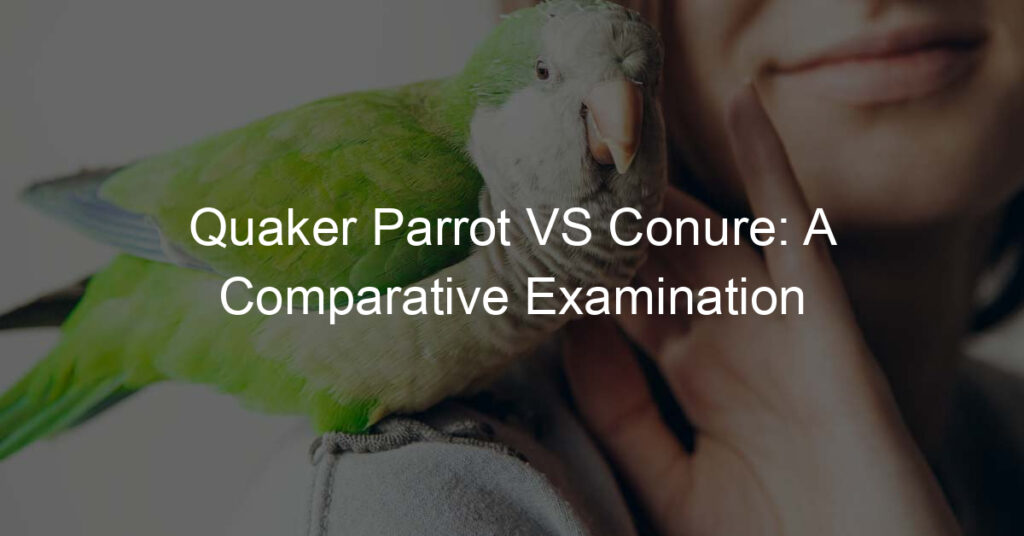If you’re considering getting a pet bird, you might wonder which species to choose. Two popular options are the Quaker Parrot VS Conure.
Both of these birds have their unique characteristics and can make great pets, but there are some significant differences to consider when making your choice.
The Quaker parrot, also known as the monk parakeet, is a small to medium-sized bird that is native to South America.
It is known for its playful and curious nature and its ability to mimic human speech.
Quaker parrots are also relatively hardy and easy to care for, making them a good choice for first-time bird owners.
Conures, on the other hand, are a diverse group of birds that come in many different colors and sizes.
Some conures are known for their playful personalities and ability to learn tricks, while others are more laid-back and affectionate.
Like Quaker parrots, conures can also be trained to mimic human speech.
Yet, they require more attention and care than Quaker parrots, so they are better suited for experienced bird owners.
Key Takeaways
- Quaker parrots are hardy and easy to care for, making them a good choice for first-time bird owners.
- Conures are a diverse group of birds with varying personalities and care requirements.
- Both Quaker parrots and conures can be trained to mimic human speech.
Quaker Parrot: An Overview
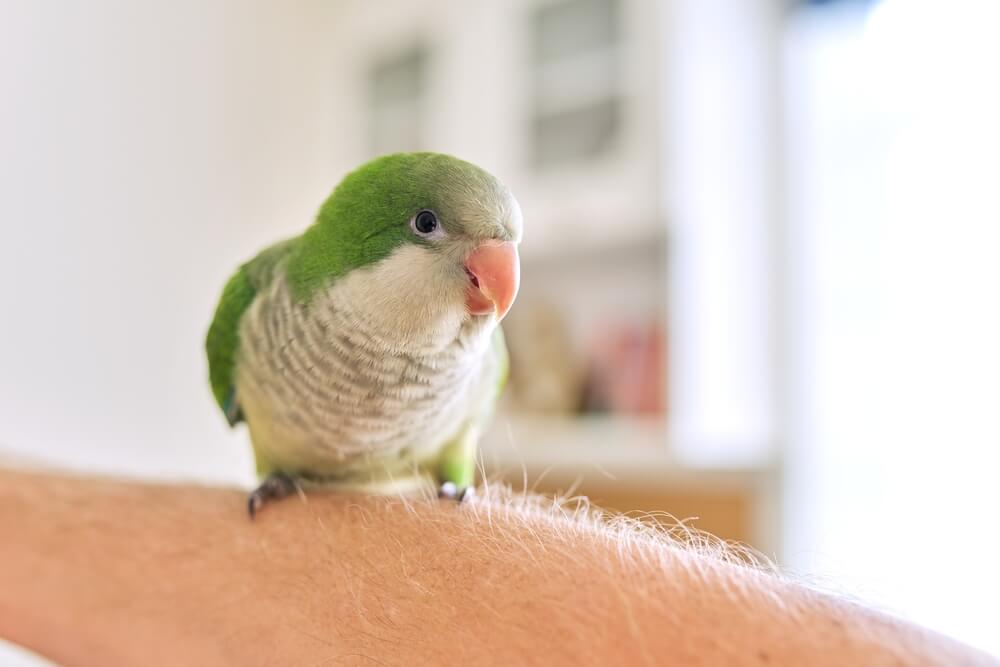
If you are considering adding a Quaker Parrot to your family, knowing some basic facts about these birds is essential.
Here is a brief overview of Quaker Parrots to help you make an informed decision.
Physical Characteristics
Quaker Parrots are medium-sized birds, measuring around 11-12 inches long and weighing approximately 100-130 grams.
They have a green body with a gray face and breasts, and a distinctive white eye ring surrounds their eyes.
They also have a long tail and strong, hooked beaks.
Personality
Quaker Parrots are known for their playful, curious, and social personalities.
They are intelligent birds and can learn to mimic human speech and sounds.
They are also very active and require plenty of mental and physical stimulation to stay healthy and happy.
Care and Maintenance
Quaker Parrots require a balanced diet of fresh fruits, vegetables, and high-quality pellets.
They also need plenty of toys and activities to keep them entertained and stimulated.
Quaker Parrots are also known for their strong beaks, so it is important to provide them with plenty of chew toys to prevent boredom and destructive behavior.
Lifespan
Quaker Parrots can live up to 25 years with proper care and attention.
They are relatively hardy birds and can adapt well to different environments, making them popular for pet owners.
Overall, Quaker Parrots are an excellent choice for those looking for an intelligent, playful, and social bird.
With proper care and attention, they can make wonderful and entertaining companions for many years to come.
Conure: An Overview
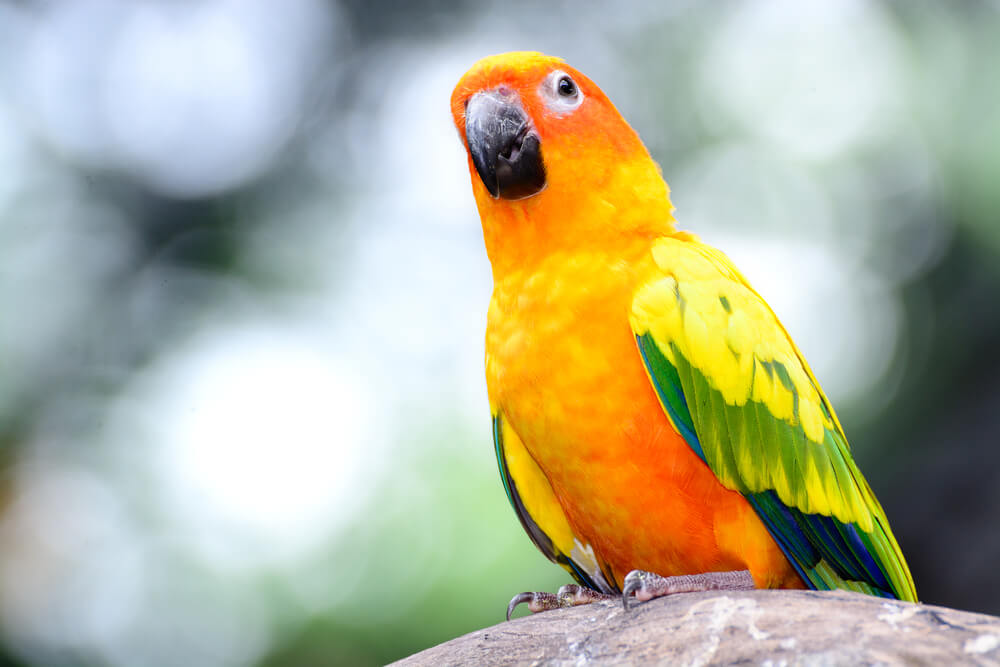
If you consider a Conure as a pet, you are in for a treat. Conures are known for their playful personalities and affectionate nature.
They are popular among bird lovers due to their vibrant colors, intelligence, and ability to form strong bonds with their owners.
Physical Characteristics
Conures are small to medium-sized parrots with a stocky build and short, broad tails. They come in a variety of colors, including green, blue, red, yellow, and orange.
Some species have a combination of colors, while others have a single dominant color. They have a curved beak that is designed for cracking open nuts and seeds.
Personality
Conures are social birds and love to interact with their owners. They are playful and curious and enjoy exploring their surroundings.
They are also known for their vocalizations, ranging from quiet chirps to loud screeches.
Conures are intelligent birds and can learn to mimic words and phrases with proper training.
Care and Maintenance
Conures require a spacious cage with plenty of room to move around. They need a variety of toys and perches to keep them entertained and stimulated.
A balanced diet of fresh fruits, vegetables, and high-quality pellets is essential for their health.
Conures also require regular exercise and socialization to prevent boredom and aggression.
In summary, Conures are a great choice for bird lovers who want a playful, affectionate, and intelligent pet.
They can make wonderful companions with proper care and attention for many years.
Physical Characteristics: Quaker Parrot VS Conure

Regarding physical characteristics, there are some key differences between Quaker Parrots and Conures.
In this section, we will explore each bird’s size and weight, color variations, and lifespan.
Size and Weight
Quaker Parrots are generally smaller than Conures, measuring around 11 to 12 inches long and weighing 3.5 to 4.5 ounces.
Conures can range in size from 10 to 20 inches and can weigh up to 8.5 ounces.
This means that Conures are generally larger and heavier than Quaker Parrots.
Color Variations
Both Quaker Parrots and Conures come in a variety of colors. Quaker Parrots are typically green, with gray feathers on their forehead and cheeks and blue flight feathers.
However, Quaker Parrots also have blue, yellow, and white variations.
Conures come in a wider range of colors, including green, blue, yellow, red, and orange.
Some Conures also have multi-colored feathers, with different colors on their wings, tail, and body.
Lifespan
Quaker Parrots have a lifespan of around 20 to 30 years in captivity. Conures can live slightly longer, with a lifespan of around 25 to 30 years in captivity.
However, with proper care, both birds can live even longer.
Both Quaker Parrots and Conures are beautiful birds with unique physical characteristics.
When choosing between the two, it’s important to consider not only their appearance but also their personality and care requirements.
Behavior and Temperament: Quaker Parrot VS Conure
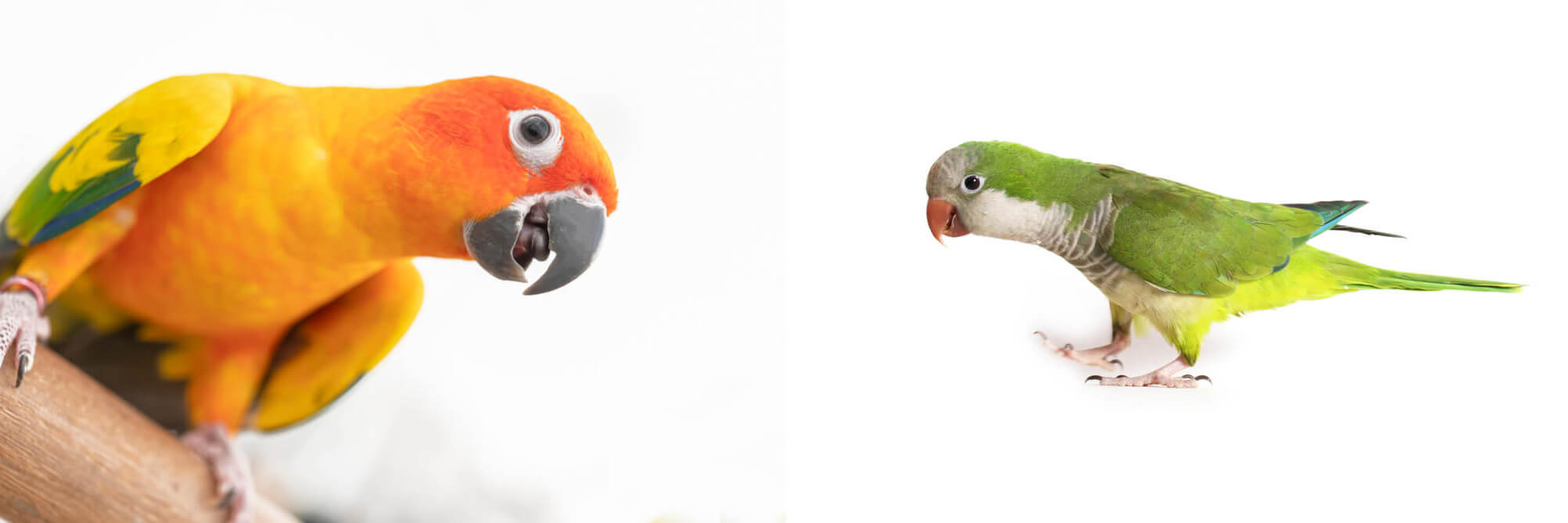
When choosing between a Quaker Parrot and a Conure, one of the most important factors to consider is their behavior and temperament.
Here’s a breakdown of their social behavior, noise level, and training capability.
Social Behavior
Both Quaker Parrots and Conures are social birds that require regular interaction and attention from their owners.
Nevertheless, Quaker Parrots tend to be more independent and less demanding than Conures.
They are capable of entertaining themselves for extended periods of time and do not require as much one-on-one attention.
On the other hand, Conures are known for their affectionate and playful nature.
They love to be around their owners and crave attention and affection.
They are also more likely to form strong bonds with their owners and become attached to them.
Noise Level
When it comes to noise level, both Quaker Parrots and Conures can be pretty vocal.
Quaker Parrots are known for their high-pitched squawking, while Conures are known for their loud and repetitive screeching.
Yet, Quaker Parrots tend to be quieter overall and are less likely to disturb your neighbors.
Training Capability
Both Quaker Parrots and Conures are intelligent birds that can be trained to do various tricks and behaviors.
Nonetheless, Conures are generally considered to be easier to train than Quaker Parrots.
They are more responsive to positive reinforcement and tend to pick up new behaviors more quickly.
Quaker Parrots, on the other hand, can be more stubborn and independent, which can make them more challenging to train.
Their training may require more patience and consistency to achieve desired results.
Both Quaker Parrots and Conures make great pets with unique personalities and behaviors.
When choosing between the two, it’s important to consider your lifestyle and preferences to determine which bird would best fit you.
Dietary Needs: Quaker Parrot VS Conure
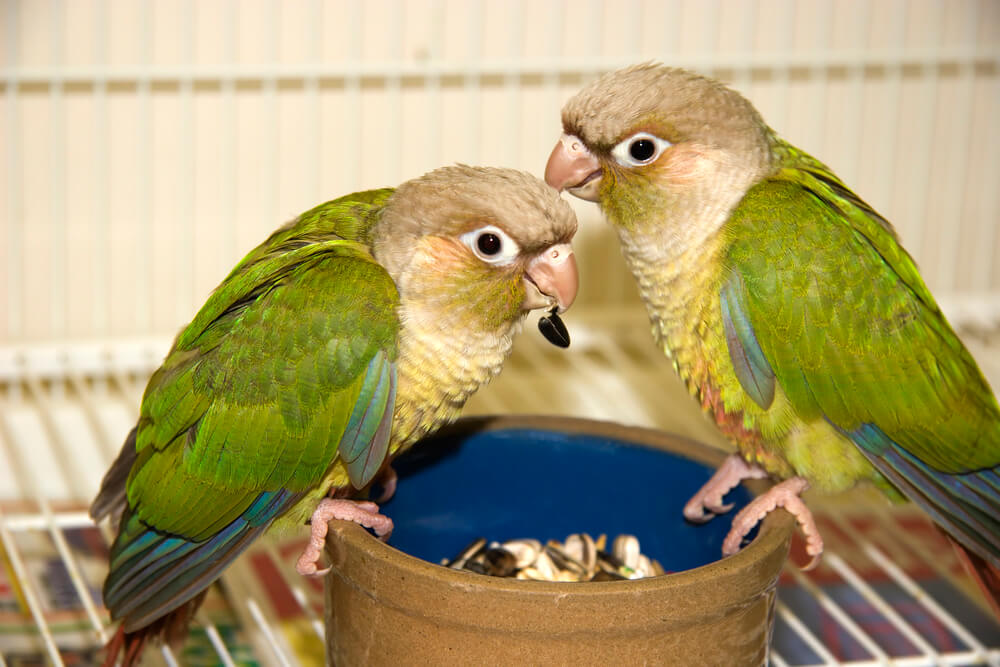
When it comes to the dietary needs of Quaker Parrots and Conures, there are some similarities and differences that you should be aware of.
In this section, we will discuss the food preferences and special dietary requirements of these two bird species.
Food Preferences
Both Quaker Parrots and Conures are omnivores and require a balanced diet of fruits, vegetables, nuts, and seeds.
However, Conures require more fruits and vegetables in their diet than Quaker Parrots.
Conures are known to have a sweet tooth and enjoy eating fruits like apples, bananas, and grapes. They also like leafy greens such as spinach and kale.
Quaker Parrots, on the other hand, prefer to eat a variety of seeds, including sunflower, safflower, and millet.
They also enjoy eating fruits like apples and pears, as well as vegetables such as carrots and peas.
It is important to note that both Quaker Parrots and Conures need a varied diet to ensure that they receive all the necessary nutrients.
You should provide your bird with a mix of fruits, vegetables, nuts, and seeds to keep them healthy and happy.
Special Dietary Requirements
In addition to their regular diet, Quaker Parrots and Conures may have special dietary requirements depending on their age, health, and activity level.
For example, if your bird is a breeding female, she may need extra calcium in her diet to support egg production. You can provide calcium by offering a cuttlebone or a calcium supplement.
If your bird is overweight, you may need to adjust their diet to help them lose weight.
You can do this by reducing the amount of high-fat foods in their diet and increasing the amount of fruits and vegetables.
It is also essential to provide your bird with fresh, clean water at all times.
You should change their water at least once a day to ensure it is fresh and bacteria-free.
In summary, Quaker Parrots and Conures have similar dietary needs but may have different food preferences.
Providing your bird with a varied diet that includes fruits, vegetables, nuts, and seeds is vital.
Also, you may need to adjust their diet based on their age, health, and activity level.
Housing Requirements: Quaker Parrot VS Conure
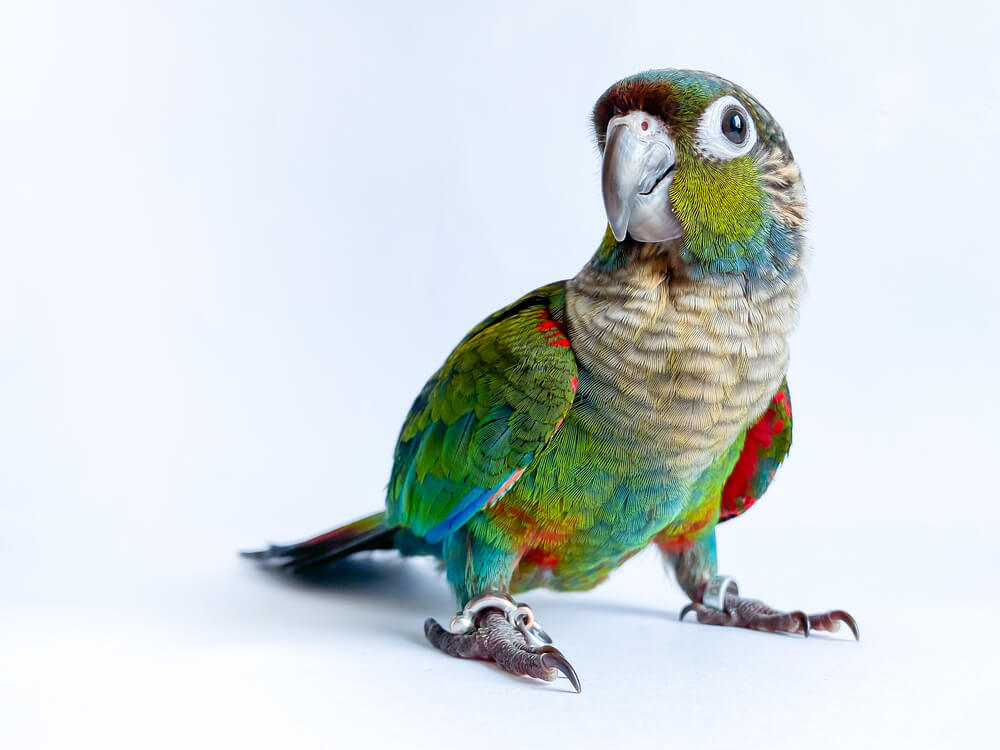
Regarding housing requirements, both Quaker Parrots and Conures have similar needs.
You need to provide a spacious cage with plenty of room for them to move around, play, and exercise.
Yet, there are some differences between these two species that you should keep in mind.
Cage Size
Quaker Parrots are smaller than Conures, requiring a slightly smaller cage.
A cage that is at least 24 inches wide, 24 inches deep, and 24 inches high should be sufficient for a single Quaker Parrot.
However, if you have a pair or more, you need to provide a larger cage with more space for them to move around.
On the other hand, Conures are larger and more active than Quaker Parrots, so they require a larger cage.
A cage that is at least 30 inches wide, 30 inches deep, and 36 inches high should be sufficient for a single Conure.
If you have a pair or more, you need to provide a larger cage with more space for them to move around.
Enrichment Needs
Both Quaker Parrots and Conures are intelligent and active birds that require plenty of mental and physical stimulation to stay healthy and happy.
You need to provide them with a variety of toys, perches, and other enrichment items to keep them entertained and engaged.
Quaker Parrots are known for their love of chewing, so you need to provide them with plenty of toys they can chew on, such as wooden blocks, ropes, and paper-based toys.
They also love swings, ladders, and other items that allow them to climb and play.
Conversely, conures are more active and playful than Quaker Parrots, so they require more toys and enrichment items to keep them entertained.
They love toys that they can shred, such as paper-based toys, and toys that they can climb on, such as ropes and ladders.
They also love swings, bells, and other items that make noise.
Both Quaker Parrots and Conures require a spacious cage with plenty of room for them to move around, play, and exercise.
You need to provide a slightly smaller cage for a Quaker Parrot than a Conure.
Additionally, both species require plenty of mental and physical stimulation to stay healthy and happy, but the types of toys and enrichment items they prefer may differ.
Health Concerns: Quaker Parrot VS Conure
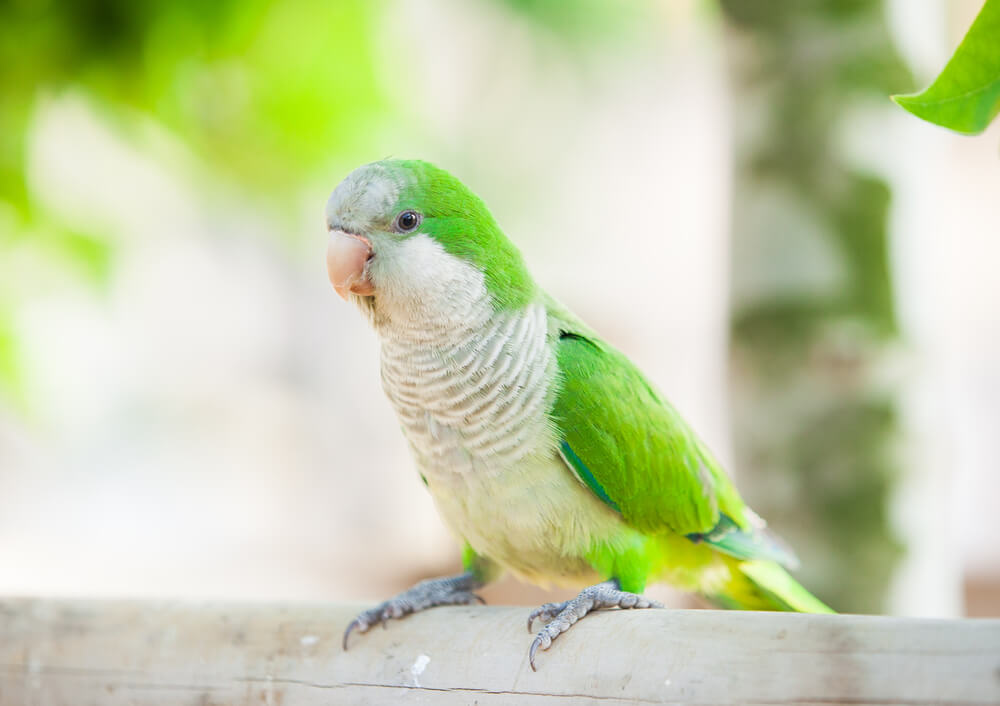
When it comes to health concerns, both Quaker parrots and Conures are generally healthy birds.
You should be aware of some common diseases and conditions if you are considering adopting one of these birds as a pet.
Common Diseases
Quaker Parrot
Quaker parrots are susceptible to a few common diseases, including:
- Psittacosis: This is a bacterial infection that can be transmitted to humans. Symptoms include fever, chills, headache, muscle aches, and a dry cough. If you suspect that your Quaker parrot has psittacosis, you should take them to a veterinarian immediately.
- Feather picking: This is a behavioral disorder that can be caused by stress, boredom, or a lack of mental stimulation. If your Quaker parrot is feather-picking, you should try to identify the cause and provide them with more mental and physical stimulation.
- Aspergillosis: This is a fungal infection that can affect the respiratory system of birds. Symptoms include difficulty breathing, sneezing, and coughing. If you suspect that your Quaker parrot has aspergillosis, you should take them to a veterinarian immediately.
Conure
Conures are also susceptible to a few common diseases, including:
- Psittacosis: Just like Quaker parrots, Conures can also contract psittacosis. If you suspect that your Conure has psittacosis, you should take them to a veterinarian immediately.
- Beak and feather disease: This is a viral disease that affects the feathers and beaks of birds. Symptoms include feather loss and abnormal beak growth. If your Conure has beak and feather disease, there is no cure, but you can help manage the symptoms with proper care.
- Polyomavirus: This is a viral disease that can cause a variety of symptoms, including lethargy, weight loss, and diarrhea. If you suspect that your Conure has polyomavirus, you should take them to a veterinarian immediately.
Veterinary Care
It is important to take your Quaker parrot or Conure to a veterinarian for regular check-ups and address any health concerns.
A qualified avian veterinarian can provide your bird with the proper care and treatment they need to stay healthy.
During a check-up, the veterinarian will examine your bird’s overall health, including their weight, beak, and feathers.
They may also perform tests to check for common diseases and infections.
In addition to regular check-ups, it is crucial to provide your bird with a healthy diet, plenty of exercise, and a clean living environment to help prevent the onset of common diseases and health issues.
Both Quaker parrots and Conures make great pets, but it is important to be aware of the potential health concerns and to provide your bird with the proper care and treatment they need to stay healthy.
Conclusion
In conclusion, both Quaker Parrots and Conures make great pets, but they differ in many ways from each other.
Here’s a quick summary of the main differences:
Size and Appearance
Quaker Parrots are generally smaller than Conures, measuring around 11 to 12 inches long and weighing 3.5 to 4.5 ounces.
Conures can range in size from 10 to 20 inches and can weigh up to 8.5 ounces. Quaker Parrots have a short, curved beak, which is designed for cracking open nuts and seeds.
Conures have a longer, more pointed beak, better suited for eating fruit and other soft foods.
Personality
Quaker Parrots are known for being social and affectionate with their owners. They can be quite cuddly depending on the individual bird and how they are raised with their owners.
Conures are also social birds, but they can be more independent and less cuddly than Quaker Parrots.
They are known for being playful and active and love exploring their surroundings.
Noise Level
Quaker Parrots are known for being noisy birds, especially if they are not given enough attention and stimulation.
They can become quite loud and vocal, which may not be suitable for apartment living or close neighbors.
Conures are also known for being noisy, but Quaker Parrots are generally less loud than they are.
Lifespan
Both Quaker Parrots and Conures can live for a long time with proper care and attention.
Quaker Parrots can live up to 25 years or more, while Conures can live up to 30 years or more.
Choosing between a Quaker Parrot and a Conure depends on personal preference and lifestyle.
If you are looking for a smaller, cuddly bird that loves attention, a Quaker Parrot may be the right choice for you.
A Conure may be the better choice if you are looking for a more active, playful bird that is less cuddly but still social.
Frequently Asked Questions
What is the lifespan of a Quaker parrot?
Quaker parrots have a relatively long lifespan for a pet bird, living up to 25 years.
With proper care and attention, some Quaker parrots have been known to live up to 30 years.
What are the differences between blue and green Quaker parrots?
The main difference between blue and green Quaker parrots is their color. Blue Quaker parrots have a blue-gray coloration, while green Quaker parrots have a bright green coloration.
There are no significant differences in temperament or care requirements between the two colors.
Can Quaker parrots and conures mate?
While it is possible for Quaker parrots and conures to mate, it is not recommended.
Mating between different species can result in hybrid offspring with health issues or behavioral problems.
Do Quaker parrots get along with conures?
Quaker parrots and conures can get along if introduced properly and have enough space to coexist peacefully.
Supervising their interactions and providing separate living spaces is important if necessary.
Which conure breed is known for being the friendliest?
The Green Cheek Conure is known for being one of the friendliest conure breeds. They are playful, affectionate, and enjoy interacting with their owners.
What are some potential drawbacks of owning a Quaker parrot?
Quaker parrots can be loud and vocal, which may not be suitable for all living situations. They also require daily socialization and mental stimulation to prevent boredom and behavioral issues.
Additionally, Quaker parrots have strong beaks and can be destructive if not provided with enough toys and chewable items.

